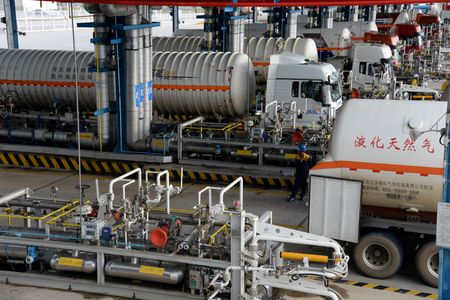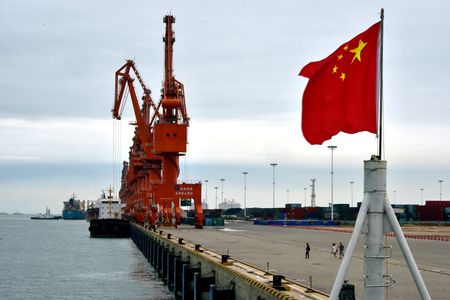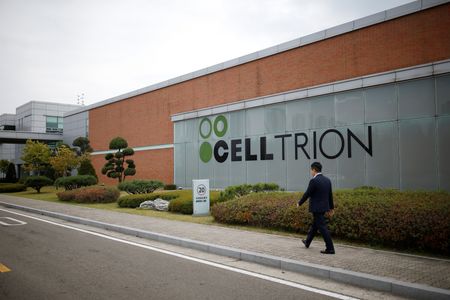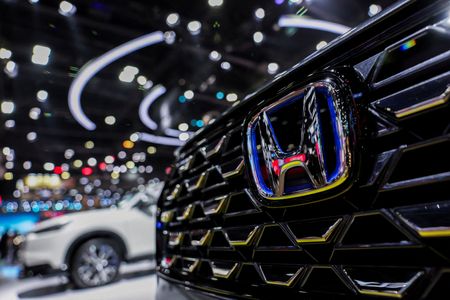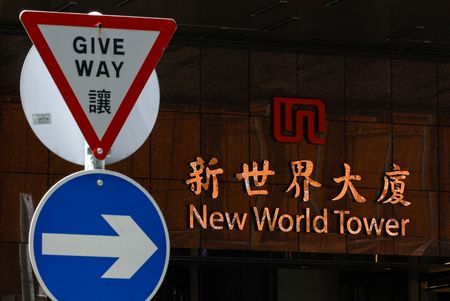By Marwa Rashad, Emily Chow, Chen Aizhu and Anna Hirtenstein
LONDON/SINGAPORE (Reuters) -Russian liquefied natural gas producer Novatek has slashed the prices of its cargoes by 30% to 40% since August to entice Chinese buyers to purchase sanctioned gas from its Arctic LNG 2 project, sources familiar with the matter told Reuters.
The purchases have ended the commercial limbo for the $21-billion project, which is subject to some of the harshest sanctions the U.S. and Europe have imposed on Russia.
Washington is seeking to block the flow of oil and gas revenue to Kremlin coffers as U.S. President Donald Trump ratchets up pressure on Moscow to end its war in Ukraine. The White House has also threatened action against countries that continue to buy Russian energy exports.
But China, a longtime ally of Russian President Vladimir Putin, opposes Western sanctions.
Cracking down on Chinese entities flouting them could prove tricky. Washington only last month struck a delicate truce in its trade war with Beijing, and one senior industry source said enforcing the measures could jeopardise U.S. ambitions of doing its own LNG deals with China.
DEEP DISCOUNTS DRAW CHINESE BUYERS TO PUTIN-LINKED PROJECT
Novatek, which is co-owned by some of Putin’s closest allies, started producing LNG at the plant in December 2023. But it failed to sell a single cargo until August this year, when it slashed prices for Chinese buyers.
The gas producer sold its first cargo, which was delivered on August 28, at a discount of $3 to $4 to the Asian benchmark LNG price of around $11 per mmBtu, according to an industry source familiar with the deal.
For subsequent deliveries – there have been 14 in total since August – Chinese buyers continued to receive steep discounts of around 30% to 40%, a second source familiar with the deals said.
That means cargoes are selling at $28 million to $32 million, well below their market value of over $44 million.
The prices of the cargoes have not been previously reported. Reuters has been unable to ascertain the names of the Chinese companies that bought them.
Novatek did not respond to a Reuters request for comment.
WASHINGTON NOT ENFORCING ITS SANCTIONS
Much of Moscow’s oil and gas is not directly subject to Western sanctions. And China is the world’s biggest buyer of its energy exports.
Trump’s predecessor President Joe Biden, however, imposed specific sanctions on Arctic LNG 2 as well as related entities and vessels soon after it began operations in December 2023.
French partner TotalEnergies subsequently walked away from the project, though two of China’s largest energy firms – China National Petroleum Corp and China National Offshore Oil Corporation – remained, each with a 10% stake.
The sanctions have also derailed Russian hopes of acquiring a fleet of Arc7 ice-class tankers to make year-round deliveries.
Until August, without a buyer, cargoes from the project floated at sea or were transferred to storage units, costing Novatek millions of dollars, according to traders.
Trump has made ending the war in Ukraine a foreign policy priority. And to pressure Moscow to negotiate, he has broadened U.S. sanctions targeting Russian energy, pressed allies to do the same, and threatened countries buying Russian exports, including India, with steep tariffs.
So far, however, Washington has not moved to punish Chinese entities involved in the Arctic LNG 2 purchases.
“They are pressuring their allies to stop importing Russian gas or LNG. But they are not implementing their own sanctions on Arctic LNG 2,” said Anne-Sophie Corbeau, a researcher at Columbia University’s Center on Global Energy Policy.
The White House did not respond to a Reuters request for comment, asking if the administration was concerned by the LNG purchases and if there were any efforts under way to discourage or prevent the transactions.
China’s government has approved the purchases, said the two Beijing-based senior industry sources. And the Chinese business registration portal shows the Beihai LNG Terminal in southern China, to which the cargoes are being delivered, is run by state-owned energy infrastructure monopoly PipeChina.
When asked if the government gave guidance over the imports or if it was concerned Washington might impose sanctions on PipeChina, which runs most of the country’s oil and gas infrastructure, the office of the foreign ministry spokesperson did not directly comment but reiterated China’s opposition to unilateral sanctions and “long-arm jurisdiction”.
“Energy cooperation between China and Russia is normal economic and trade cooperation beneficial to both countries’ people,” the spokesperson’s office said.
BEIHAI BECOMES CHINA’S DEDICATED RUSSIAN LNG IMPORT TERMINAL
Prior to August, Beihai, a mid-sized terminal, had been used to import gas from various sources and companies, including eight U.S. LNG cargoes in 2024.
But since August, PipeChina has refused to grant other companies access to Beihai, which has effectively become a dedicated entry point for Russian gas, said a third Chinese source, a trader with direct knowledge of the matter.
The UK government imposed sanctions on Beihai in October.
PipeChina did not respond to requests for comment.
Complicating matters, Trump, who has repeatedly integrated American energy exports into trade deals with partners seeking to reduce U.S. tariff burdens, has voiced his desire to sell more LNG to China.
The United States would find it difficult to sanction PipeChina as that would also block U.S. gas sales, a Western energy executive, who sells gas into China, told Reuters.
China has not imported any U.S. LNG since February due to tariffs imposed during the trade war between the world’s two largest economies.
(Reporting by Marwa Rashad in London, Emily Chow and Chen Aizhu in Singapore; additional reporting by Moscow bureau, Jarett Renshaw in Washington and Sam Li in Beijing; Editing by Dmitry Zhdannikov, Simon Webb and Joe Bavier)

